Turn any article into a podcast. Upgrade now to start listening.
Premium Members can share articles with friends & family to bypass the paywall.
You’re reading The Morning Dispatch, our flagship daily newsletter explaining all the news you need to know today in fewer than 10 minutes. To unlock the full version, become a Dispatch member today.
Happy Monday! Greek police arrested three priests on Saturday for allegedly storing cocaine and cannabis in their church as part of a drug trafficking ring. Apparently, bake sales don’t fundraise enough in today’s economy.
Quick Hits: Today’s Top Stories
- The Senate voted 60-40 on Sunday night to move forward with a temporary funding package aimed at ending the 40-day government shutdown, the longest in U.S. history. Eight members of the Democratic caucus—Jeanne Shaheen and Maggie Hassan of New Hampshire, Dick Durbin of Illinois, Tim Kaine of Virginia, John Fetterman of Pennsylvania, Catherine Cortez Masto and Jacky Rosen of Nevada—joined by independent Angus King of Maine, crossed the aisle to support the bill. The package does not include extended health care subsidies, but Senate Republicans agreed to hold a vote on the issue. This is but a step in passing the package, which would need additional votes before it’s sent to the House of Representatives. If passed, the measure would fund the government through January 30, providing Congress with time to negotiate a full annual appropriations bill or another continuing resolution. Democratic congressional leaders, including Senate Minority Leader Chuck Schumer and House Minority Leader Hakeem Jeffries, oppose the bill.
- On Friday night, Supreme Court Justice Ketanji Brown Jackson issued an emergency ruling to temporarily block a federal judge’s ruling that required President Donald Trump’s administration to distribute all Supplemental Nutrition Assistance Program (SNAP) benefits during the shutdown. Jackson ruled that the lower-court ruling will be stayed until 48 hours after an appeals court decides on the merits of the case. On Sunday, the Department of Agriculture ordered states to “undo any steps taken to issue full SNAP benefits for November 2025,” according to Deputy Undersecretary Patrick Penn, warning that full payments were “unauthorized.” To learn more about Jackson’s ruling, read Amy Howe’s piece at SCOTUSblog.
- Overnight Friday, Russia launched a missile and drone attack on Ukrainian energy infrastructure—including substations powering nuclear power plants—killing at least seven people. Ukrainian Foreign Minister Andrii Sybiha tweeted on Saturday that “Russia is deliberately endangering nuclear safety in Europe,” and called for the United Nations’ nuclear watchdog, the International Atomic Energy Agency, to meet and “respond to these unacceptable risks.” On Saturday night, Russia launched a further 69 drones at Ukrainian energy facilities, almost half of which the Ukrainian forces shot down. Ukraine responded on Sunday, striking energy infrastructure across Russian border regions, leaving more than 20,000 people without power. The latest action comes a week after Russian leader Vladimir Putin signed a law activating reserve forces for “special training” to protect critical infrastructure. Meanwhile, Kremlin spokesman Dmitry Peskov refuted claims that Russian Foreign Minister Sergei Lavrov had “fallen out of favor” with Putin. He added, “Lavrov is certainly continuing to serve as foreign minister.”
- James Watson, the Nobel Prize-winning scientist who co-discovered the double helix structure of DNA and led the Human Genome Project, died on Thursday at the age of 97. Watson, along with British scientist Francis Crick, co-authored a 1953 paper in Nature proposing that DNA, the genetic makeup for all living things, took the shape of a twisted ladder, or double helix. The discovery—made when Watson was just 25 years old—revolutionized biology and opened pathways to modern genetics, genomics, and personalized medicine. In 1962, Watson, Crick, and Maurice Wilkins, a New Zealand-British biophysicist, were awarded the Nobel Prize in Physiology or Medicine. In 1965, Watson published Molecular Biology of the Gene, which became one of the most widely used biology textbooks. He is survived by his wife, Elizabeth Lewis Watson, and their two sons, Rufus and Duncan.
- The Recording Academy announced Grammy Awards nominations on Friday, with Kendrick Lamar receiving the most, at nine, including for record, song, and album of the year. Lamar’s nominations mark the third time he has simultaneously competed in all three major categories, and his album “GNX” represents his fifth consecutive studio album nominated for album of the year—a feat no other artist has achieved. Lady Gaga tied for second-most nominations with producers Jack Antonoff and Cirkut, receiving seven, and Sabrina Carpenter, Bad Bunny, and Leon Thomas each earned six. Bad Bunny is the first Spanish-language artist to simultaneously receive nominations in the album, record, and song of the year categories. This will be the first Grammys to separate the country album awards into best traditional country album and best contemporary country album. The music from Netflix’s KPop Demon Hunters received four nominations, including song of the year for “Golden,” and Supreme Court Justice Jackson was nominated for best audiobook. The Grammy Awards ceremony will be held on February 1, 2026, in Los Angeles.
Grounded
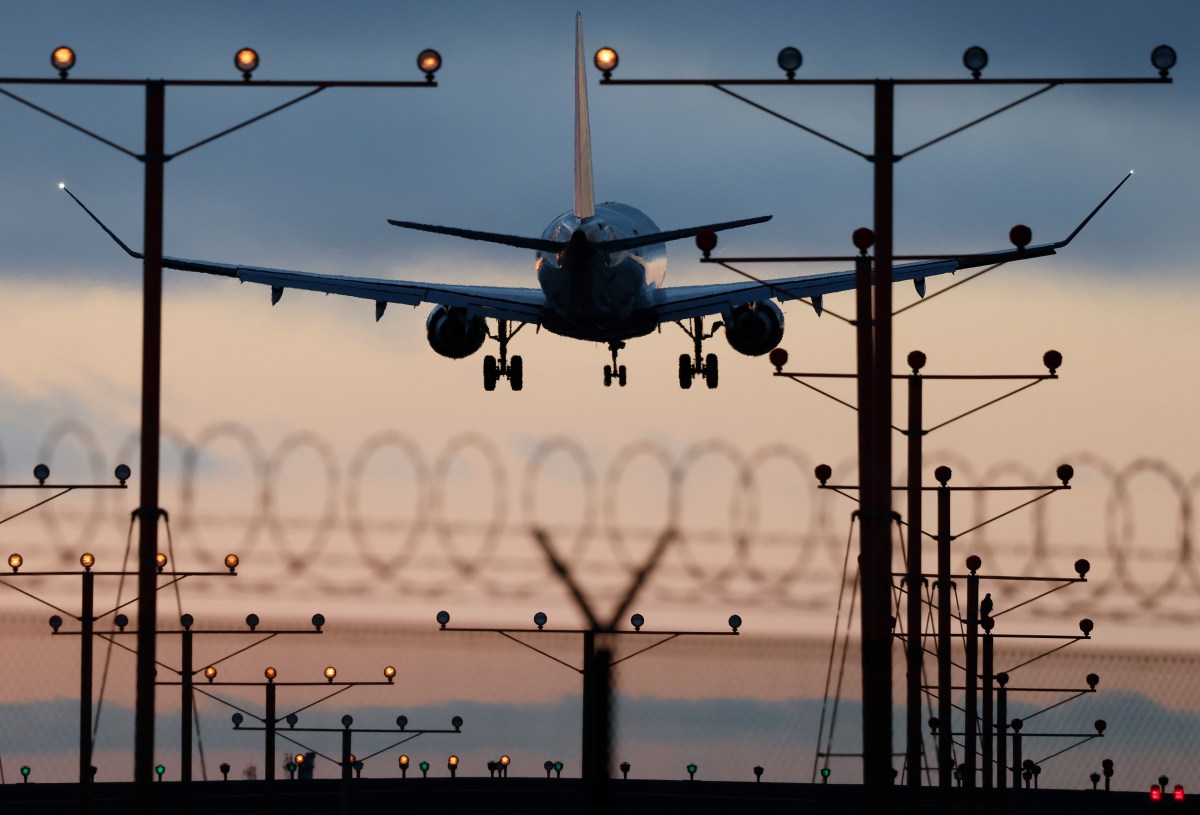
The phrase “Thanksgiving break” has never exactly conjured up visions of easy, convenient travel for many Americans. But this year’s holiday travel threatens to go from frustrating to nearly impossible if Congress fails to negotiate an end to the ongoing government shutdown.
Due to the reduced staffing, starting Friday, the Federal Aviation Administration began reducing flights at dozens of major airports. Over the weekend, travelers at New York’s LaGuardia Airport faced average delays of two and a half hours. At Newark Liberty International, it was two hours and 14 minutes. In Philadelphia, the lines may have seemed short, but there was still an average delay of one hour and 40 minutes. On Sunday alone, 10,439 flights were delayed nationwide, and, as of publication, almost 6,000 flights have been canceled since Friday. (The FAA handles roughly 44,000 flights per day.)
And this is only the beginning. Starting Friday, Transportation Secretary Sean Duffy announced, domestic flights at the 40 busiest U.S. airports were reduced by 4 percent. If the shutdown continues until Tuesday, that number will rise to 6 percent, then 8 percent on Thursday, and 10 percent on Friday.
“You’re going to see air travel be reduced to a trickle,” Duffy told CNN’s State of the Union on Sunday. “We have a number of people who want to get home for the holidays … many of them are not going to be able to get on an airplane because there are not going to be that many flights that fly if this thing doesn’t open back up.”
You are receiving the free, truncated version of The Morning Dispatch. To read the full newsletter—and unlock all of our stories, podcasts, and community benefits—join The Dispatch as a paying member.
The trouble here likely prompted a few Democratic senators to cross the aisle to vote in favor of progressing a government funding bill on Sunday evening. But even if the government reopens within the next few days, restoring the system to full strength will take time—and long-running issues with the design of America’s air travel agencies and infrastructure mean capacity issues at American airports are likely here to stay.
The primary reason for the reduction in flights is safety concerns. Air traffic controllers aren’t being paid during the shutdown. If they do show up to work, they have found that many of their colleagues didn’t, leaving the crucial position understaffed. Duffy told CNN that on Saturday at Atlanta’s Hartsfield-Jackson airport—consistently ranked the busiest airport in the world—18 of 22 air traffic controllers failed to arrive for work. On Saturday, at that airport alone, 370 flights were canceled, and 683 were delayed.
When flights at one airport are canceled, the “national airspace system is subject to cascading or ripple-type effects,” Philip Mann, a professor at Embry-Riddle Aeronautical University and a 17-year veteran of the FAA, told TMD. The FAA tries to plan for known disruptions, but a government shutdown is far too broad and significant to balance against.
Multiple aviation experts who spoke to TMD also noted that while worries about flight disruptions are very much warranted, travelers should not be concerned about flight safety. “It makes total sense what’s being done from a safety perspective,” Shawn Pruchnicki, a professor at Ohio State University and the former Air Line Pilots Association chief accident investigator, told TMD. “We have all worked very hard, all of us in the industry, to achieve a significant margin of safety” for events like the shutdown, he said. A reduction in flights, he argued, meant that federal regulators were preserving a balance between the number of planes in the air and the number of air traffic personnel directing them.
Mann also noted that the FAA’s safety mission takes priority over its other mandate, to ensure efficient travel. Air travel remains “super, super, super, safe,” he said. For all the pain flight reductions are causing, the government maintains that the changes are simply the FAA following its mandate, rather than an attempt to inflict political punishment. “This is not political. This is strictly safety,” said Duffy on Sunday.
The transportation secretary also told reporters that even if congressional leaders reach a deal to end the shutdown, the effects of the disruption would linger. Before the shutdown, roughly four air traffic controllers retired per day, Duffy said. “I’m now up to 15 to 20 a day are retiring, so it’s going to be harder for me to come back after the shutdown and have more controllers controlling the airspace. So this is going to live on in air travel well beyond the time frame that this government opens back up.”
Structural issues at the FAA that predate the shutdown will make Duffy’s task in leading the air travel system back to full capacity even harder. The first is its funding source. Congress funds the FAA through annual appropriations, primarily based on airline ticket taxes, Robert Poole, the director of transportation policy at the Reason Foundation, told TMD. The U.S. is “a very big outlier” compared to other countries, he said, in its reliance on what is “not a very robust or reliable revenue stream.”
Most other countries fund air traffic control systems and other infrastructure by charging the users of airspace and airport services. Nav Canada—a privately run non-profit organization established by the Canadian parliament in 1996—owns and operates the country’s air navigation system. It sets the rates paid by airlines and other users for the use of airspace and other infrastructure, and receives no government operating subsidies. But it must reinvest any profits into reducing fees or improving services, and must keep fees tied to the direct cost of service provision.
By contrast, as it’s not a separate entity from the government, the FAA is unable to issue its own bonds to fund long-term investments in its operating infrastructure. With legislators scrutinizing its budget every year and often reluctant to provide the long-term financing needed for systemic upgrades, many U.S. airports are left with a patchwork of safety and operations systems, many of which are so old that replacement parts for them no longer exist.
And, there has been a shortage of trained air traffic professionals for decades. Government officials estimate that the U.S.’s air travel system needs 14,600 trained controllers to operate, but as of earlier this year, only 10,800 were working, often on punishingly long shifts. More than 90 percent of U.S. airport towers are understaffed, according to a 2023 report.
There’s also only one facility in the U.S. solely dedicated to training their replacements: the FAA’s academy in Oklahoma City. A proposal in Congress last year to build a second facility to expand the controller pipeline (through a training process that takes years) died due to opposition from Oklahoma’s delegation. However, in October 2024, the FAA signed agreements with Tulsa Community College and the University of Oklahoma to provide the same curriculum and training in a college setting, and seven other colleges and universities have signed up since.
As the country nears the busiest travel days of the year, an official end to the shutdown will still leave the FAA with a mammoth task on its hands.
“It’s going to take us days to assess the controllers coming back into their facilities or their towers,” Duffy said on Friday. After that, airlines will need to rebook the planes they grounded, and flight schedules will need to be rebooted and reorganized. “It can be days, if not a week, before we get back to full-force flights when the shutdown ends,” said Duffy.
Today’s Must-Read
Today, 25 percent of American children are raised without fathers, a crisis we’ve learned to shrug off even as research shows the profound impact on everything from college graduation to emotional resilience. In this deeply personal Monday Essay, Joe Pitts grapples with the hole in his heart that came into focus only with time—tracing his own family history while exploring what fatherlessness costs us beyond statistics. “That I was born without a father was not something I understood as significant for many years,” writes Pitts. “Those born fatherless, like those born blind, never fully understand what they’ve missed.”
Toeing the Company Line
How the Religious Left Ceded Political Power to the Religious Right
Progressive Christians have forsaken the work of building coalitions and institutions.
The Greater, the Lesser, and the Ugly
What the Supreme Court could say to a Trumpian category error.
Don’t Blame Immigrants for Mamdani’s Win
Debunking claims that immigrant support propelled the new mayor to victory.
Homeland Security’s Nativist Pitch to New Recruits
With memefied messaging, DHS is presenting its mission as preserving American culture and identity.
Will the Senate GOP Give In to Trump’s Call to End the Filibuster?
Older members are sticking with the cloture rule despite Trump’s pressure to end it.
In Other News
Today in America:
- Ed Martin—director of the DOJ’s “Weaponization Working Group”—announced Sunday night that Trump had pardoned 77 people involved in the effort to challenge the result of the 2020 election, including Rudy Giuliani, John Eastman, Kenneth Chesebro, and Sidney Powell. The pardon explicitly does not apply to President Donald Trump himself.
- Trump announced that Hungary would be granted a one-year exemption from U.S. sanctions on countries importing Russian oil, following a meeting at the White House with Hungarian Prime Minister Viktor Orbán.
- Lawyers for New York Attorney General Letitia James, seeking to dismiss federal charges related to alleged mortgage fraud, argued that she faces a vindictive prosecution, evidenced by “genuine animus” from Trump.
- Republican Rep. Elise Stefanik of New York launched a gubernatorial campaign to challenge incumbent Democrat Gov. Kathy Hochul in 2026.
- Trump directed the Justice Department to investigate meatpacking businesses, and blamed rising beef prices on their alleged “Illicit Collusion, Price Fixing, and Price Manipulation.”
- The U.S. Attorney’s Office for the Eastern District of New York on Sunday indicted two MLB players, Cleveland Guardians’ pitchers Emmanuel Clase and Luis Ortiz, for allegedly collaborating with sports gamblers to throw rigged in-game pitches for cash payments.
Around the World:
- Typhoon Fung-wong hit the northern Philippines overnight on Sunday, killing at least four people and causing extensive infrastructure damage. More than a million people have been evacuated.
- Hamas returned the remains of Hadar Goldin, a 23-year-old Israeli soldier captured and killed by Hamas in 2014.
- Iran is rationing water resources in its capital city of Tehran after a prolonged drought dwindled the country’s water supply.
- The director general and news chief for the BBC, Tim Davie and Deborah Turness, resigned on Sunday, a week after reporting from The Telegraph showed the BBC improperly edited footage from Trump’s January 6, 2021, speech.
- Thailand suspended its Trump-negotiated peace agreement with Cambodia after four Thai soldiers were injured in a landmine blast on the border.
- The State Department announced on Friday that it was removing terrorist-designation labels for Syrian President Ahmed al-Sharaa and Interior Minister Anas Khattab. Al-Sharaa is set to meet with Trump at the White House today.
On the Money:
- Blue Origin, the space company founded by Jeff Bezos, on Sunday delayed the second launch of its New Glenn rocket, citing poor weather conditions.
- OpenAI, the developer of ChatGPT, requested in a letter to the White House that tax credits for semiconductor chip production be expanded to data center projects.
- The FDA issued a recall for two lots of ByHeart-produced baby formula, after the product was linked to 13 cases of infant botulism across 10 states.
Worth Your Time:
- Julie Turkewitz, Tibisay Romero, Sheyla Urdaneta, and Isayen Herrera report on the Venezuelan men who were sent to a Salvadoran prison. (New York Times)
- Danyela Souza Egorov reviews American Federation of Teachers President Randi Weingarten’s new book. (City Journal)
- Justin Lynch looks at how both the Biden and Trump administrations have failed to take substantive action to curb the civil war and genocide in Sudan. (The Nation)
- Prashant Garg writes on how AI can provide new insight into the lyrics of Bob Dylan. (Aeon)
- Thomas Adamson interviews the 15-year-old who was photographed in mid-20th-century Holmesian attire outside the Louvre following the museum’s jewelry heist. (Associated Press)
Presented Without Comment
Washington Times: French Town Council Allows Man To Keep Gold Worth $800,000 Found When Digging for Swimming Pool
Also Presented Without Comment
LAIlluminator: Orleans Sheriff Says She Missed Campaign Report Deadline Because Her Attorney Was Incarcerated
Also Also Presented Without Comment
BBC: Australian Teen Charged Over Allegedly Sticking Googly Eyes on ‘Blue Blob’ Artwork
Let Us Know
Have any thoughts or questions about today’s newsletter? Drop us a note in the comments or by emailing us at tmd.questions@thedispatch.com. We read every submission, and your message could be featured in an upcoming “Behind the Scenes” segment.
Have any thoughts or questions about today’s newsletter? Become a member to unlock commenting privileges and access to a members-only email address. We read every submission, and answer questions in the following edition of TMD.



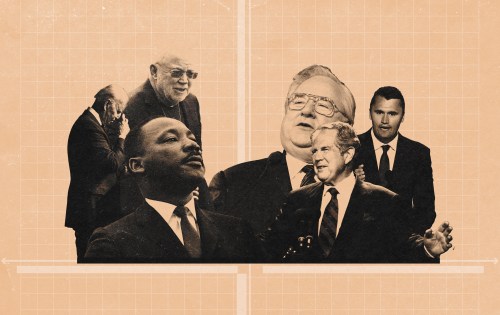
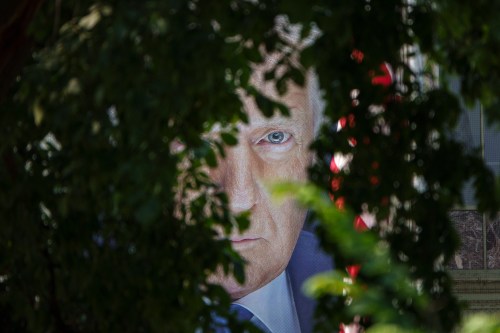
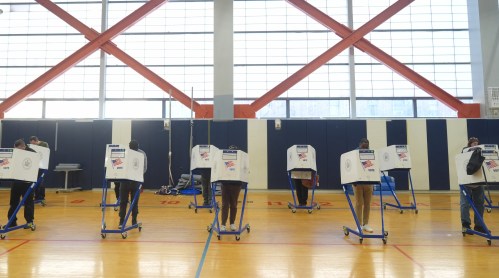

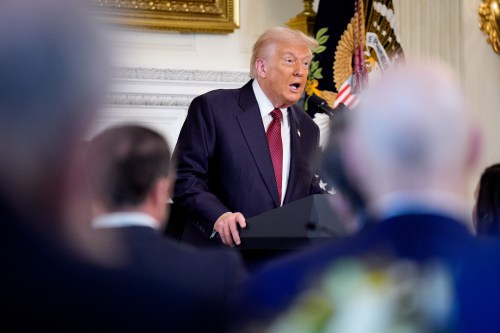




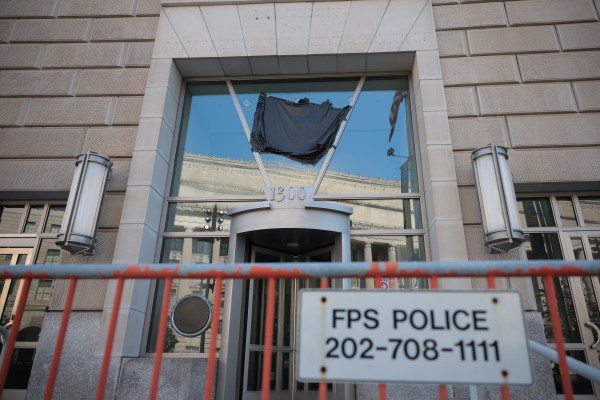



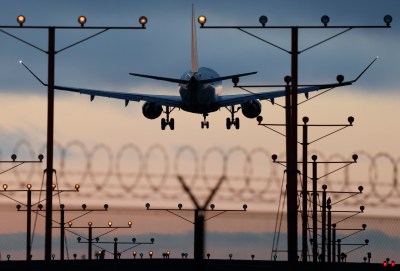
Please note that we at The Dispatch hold ourselves, our work, and our commenters to a higher standard than other places on the internet. We welcome comments that foster genuine debate or discussion—including comments critical of us or our work—but responses that include ad hominem attacks on fellow Dispatch members or are intended to stoke fear and anger may be moderated.
With your membership, you only have the ability to comment on The Morning Dispatch articles. Consider upgrading to join the conversation everywhere.